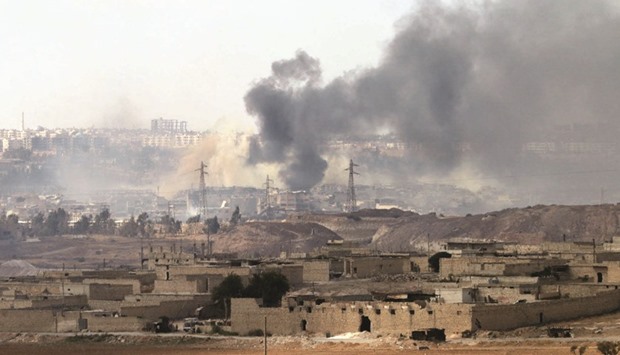The US pressed Russia on Thursday for a "true cessation of hostilities" in Syria ahead of a expected high-level peace talks in Geneva, warning that its patience is running thin.
Foreign ministers from the two powers, which support opposite sides in the five-year conflict, were poised to hold a "personal meeting" in the Swiss city to push for a peace agreement, according to the Russian side.
However, Washington did not confirm the face-to-face talks, with a spokesman for US Secretary of State John Kerry saying that negotiations were still ongoing.
And US Defense Secretary Ash Carter told BBC radio on Thursday there was "quite a long way to go" before a final deal could be struck.
He called for "a true cessation of hostilities -- not what you've seen, which is a partial cessation of hostilities", adding: "Our patience is not unlimited."
Both sides have agreed that a deal would involve a durable ceasefire, humanitarian access to conflict-wracked areas and a resumption of peace talks.
The Syria war has pitted the old Cold War rivals against each other, with Russia flying a bombing campaign in support of Syrian strongman leader Bashar al-Assad and the United States backing rebel groups fighting to oust him from power.
US President Barack Obama held talks with his Russian counterpart Vladimir Putin on the sidelines of the G20 summit in China but failed to bridge their differences.
Russian Foreign Minister Sergei Lavrov has said that new US sanctions over the Ukraine crisis have hampered joint efforts by both sides to resolve "regional conflicts" -- a reference to the Syria war.
And Carter noted: "We have our differences, serious differences, with Russia elsewhere, especially here in Europe with Ukraine and elsewhere Russia has been acting in an aggressive manner."
18-month transition
As diplomatic efforts intensified, fighting in the complex war continued to claim lives, with Turkish shelling over the border into Syria killing six US-backed Kurdish fighters.
Pro-regime forces also overran a strategically important district on the southern outskirts of Aleppo on Thursday, rolling back nearly every gain from a major month-long rebel offensive there, said the Syrian Observatory for Human Rights.
The government advance in Ramussa further seals off Aleppo's opposition-held eastern districts, where regime forces backed by the Russian air force have completely encircled opposition-held neighbourhoods.
An AFP correspondent in the city's east said shops had been struggling since Sunday to secure goods to sell and that prices were skyrocketing.
"The price of a kilo of meat rose from 3,000 pounds ($6) to 6,000," complained Ahmad, a father of three children, in the Bustan al-Qasr district which has been ravaged by air strikes and barrel bombs.
In London on Wednesday, the under-fire Syria opposition fleshed out a proposal for a transition to democracy without Assad after a six-month negotiating phase with the regime.
The opposition hopes new talks would result in an 18-month transition that would see Syria governed by an interim body made up of opposition figures, current government representatives and members of civil society, according to a 25-page blueprint.
The Syrian war, which began as a pro-democracy revolt in 2011 but morphed into a multi-front conflict after the regime unleashed a crackdown, has killed more than 290,000 people and forced more than half the population to flee their homes.
The Islamic State jihadist group has used the chaos in Syria to spread throughout the country and into Iraq although it has lost ground in recent weeks after a string of military defeats.
Turkey said on Wednesday that it was in favour of a joint operation with the US to oust the IS extremists from their de facto capital of Raqa in northern Syria.
Turkey's President Recep Tayyip Erdogan said he had agreed with Obama to do "what is necessary" to drive IS out of Raqa.
The deputy prime minister of Turkey later said that talks were underway between the two countries' militaries.

Fighting in the complex Syrian war continues to claim lives.
